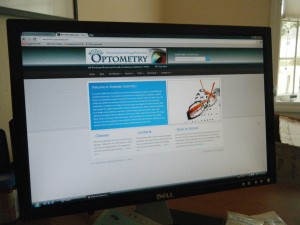Today’s gadgets and devices are placing demands on young eyes. The benefits of technology have a downside, especially when it comes to the eyes. Stress on the accommodative system (focusing) causes eye fatigue.
This can cause headaches, blurred vision and other related chronic discomforts.
Nearly 1 in 4 children are on digital devices 3 or more hours per day.
School text books are rapidly moving to tablets
40% of young adults spend at least 9 hours per day on digital devices.
[heading centered=”yes” margin_bottom=”no”]10 things you should know about digital eyestrain:[/heading]
- BLURRED VISION Think about how you look at your phone, then your computer screen, back to your phone then at the TV. Like any muscle that is holding in one position for a length of time it contracts and then has a hard time relaxing. Same goes for your eye muscles. You have been looking at near objects, the muscles have contracted, then you quickly look up and the muscles have locked up and can’t relax and your vision becomes blurred.
- TIRED EYES. Any muscle that is fatigued is going to be sore and tired.
- HEADACHES. When your eyes are tired you will get headaches. This type of headache tends to occur around the eyes.
- BODY FATIGUE. At the end of the day patients are finding they are just too tired and need to close their eyes. When the eyes are closed there is nothing for them to foccus on and the muscles can relax.
- DRY EYES. Your blink rate goes down when the eye is focusing. Every time you blink the eye needs to readjust and that is work for your eye so the blink rate drops when you focus at near work. It can drop to 10 times a minute for computer work and 4 to 6 times a minute when looking at a smart phone or tablet. Not blinking allows the eyes to dry.
- LIGHT SENSITIVITY. Eye muscles are extremely tired when working all day. When light comes into your eye it constricts the pupil which is right next to the ciliary body. the muscles that focus the eye. So when light comes into the eye it is a similar feeling to focusing. It is similar to lifting weights all day then someone comes along and punches you in the arm. That muscle is sore and tender.
- EYE RUBBING. What tired muscle doesn’t feel good when you rub it?
- POOR NIGHT VISION. Our eyes do not know how to focus on light. If you are staring at a light in the distance you wouldn’t be able to tell how far away it really is.
- REDUCED CONCENTRATION. Any time a muscle is over used, such as the eye focusing on light all day, it becomes more difficult for the eye muscles to continue to hold that position.
- DOUBLE VISION. Diplopia or double vision is caused when the eyes do not work together. Staring at near objects such as a computer, phone or tablet require persistant converging and diverging all day. The muscles become so tired they lose the ability to hold a position and we see double.
It is difficult to avoid the use of computers and tablets, but you can take steps to reduce digital eyestrain. Wearing the correct prescription and taking advantage of blue light blocking coatings are 2 ways to make your eyes more comfortable. Make an appointment.

